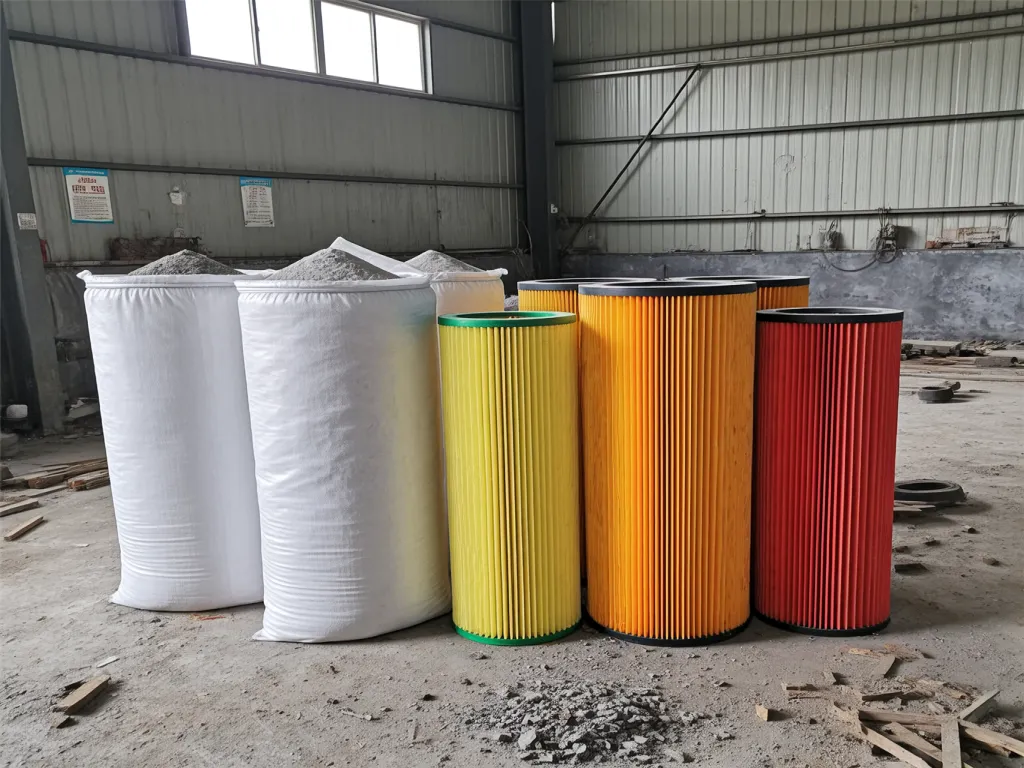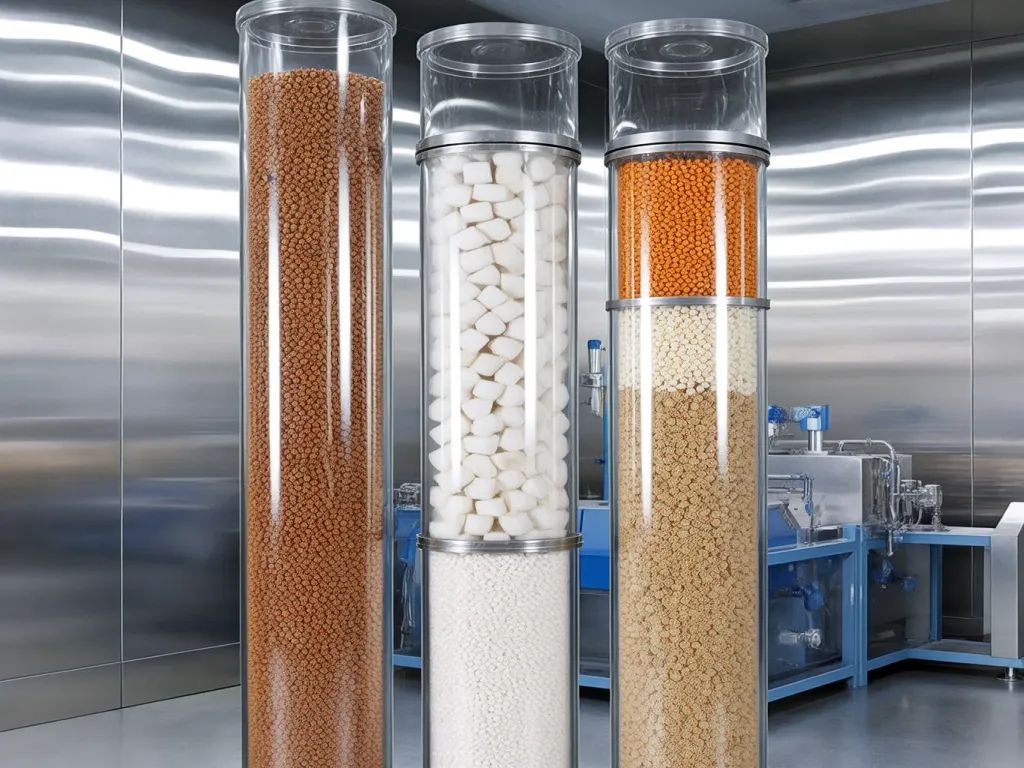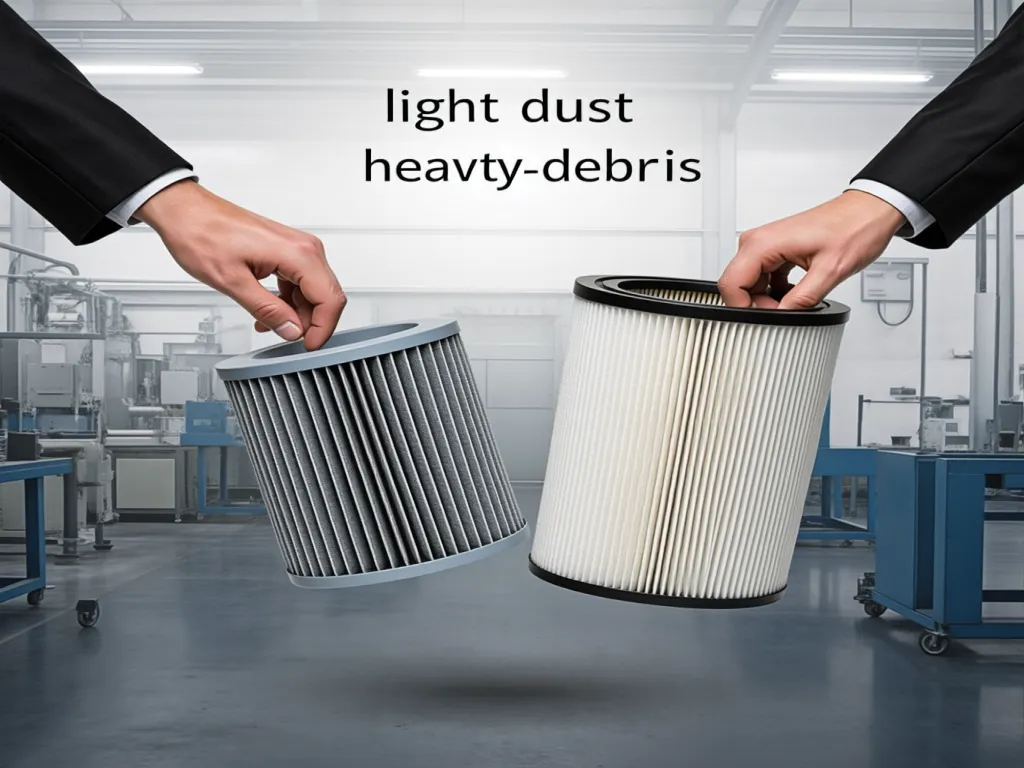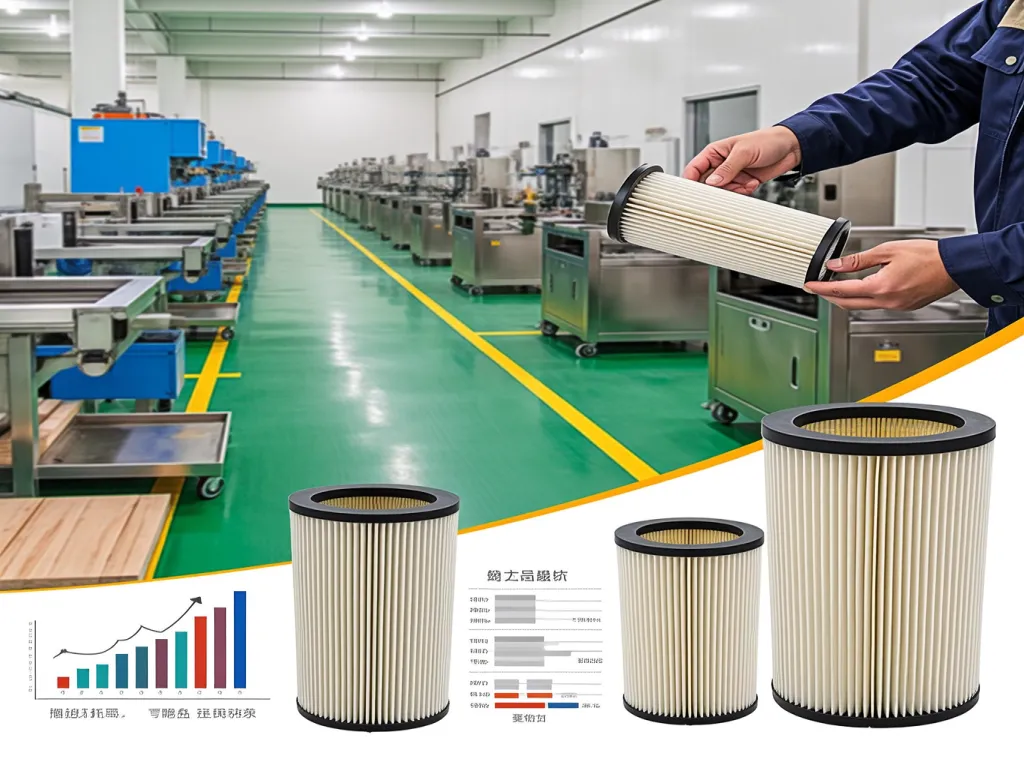Your Guide to Perfect Shop Vac Disposable Filter Bags
Navigating the world of industrial cleaning equipment can be overwhelming, especially when it comes to selecting the right shop vac disposable filter bags. Whether you’re dealing with light dust or heavy-duty debris, the efficiency and capacity of your filter bags matter significantly. But how do you know which ones are truly up to the task? In this blog, we’ll dive deep into the specifics of filter bags, analyzing how different industrial scenarios demand varying levels of filtration and dust-holding capacity. Ready to find out how to make the best choice for your workplace?

Industrial Scene Customization Guide: How to Choose the Most Suitable Shop Vac Disposable Filter Bags
When it comes to industrial cleaning, the demands on shop vac disposable filter bags can vary dramatically from one scenario to another. Whether you’re dealing with light-duty cleaning tasks or heavy-duty dust extraction, understanding the specific requirements for filtration efficiency and dust holding capacity is crucial. Let’s dive into the diverse industrial scenes and analyze what each one demands from your filter bags.
Light-Duty Cleaning: Balancing Efficiency and Capacity
In light-duty cleaning scenarios, the key is to strike a balance between filtration efficiency and dust holding capacity. You don’t need the most advanced filtration technology, but you do need a bag that can effectively capture larger particles and resist clogging. Look for filter bags made from durable materials that can withstand the occasional bump or scrape. Polyester or blended fabrics often work well here, offering a good mix of efficiency and longevity. For instance, our wholesale polyester pocket filter bags are designed for such applications. Remember, even in light-duty settings, a well-chosen filter bag can make a significant difference in maintaining a clean and healthy workspace.
Medium-Duty Applications: Prioritizing Health and Efficiency
For medium-duty applications, the focus shifts to health and safety. The filter bags you choose must be capable of trapping finer particles, including those that could pose health risks. HEPA-rated filter bags are often a good choice here, as they can capture up to 99.97% of particles as small as 0.3 microns. However, HEPA filters can be more expensive, so it’s essential to balance cost with performance. Additionally, consider the dust holding capacity. A bag that can hold more dust means fewer interruptions for replacements, keeping your operations running smoothly. For environments generating metal shavings or chemical residues, our PTFE-coated polyester dust filter bags offer enhanced durability and filtration.
Heavy-Duty Environments: Demanding the Best in Filtration and Capacity
In heavy-duty industrial environments, there’s no room for compromise. You need filter bags that offer the highest filtration efficiency and exceptional dust holding capacity. Look for bags made from advanced materials like nanofiber or PTFE-coated fabrics, which can capture even the finest particles while resisting abrasion and chemical exposure. The construction of the bag is also crucial. Reinforced seams, sturdy frames, and multiple layers of filtration media can all contribute to a longer-lasting, more effective filter bag. For extreme conditions like mining or cement production, our polyester dust collector filter bags are engineered to withstand prolonged exposure to high volumes of dust without clogging or tearing. In these settings, investing in high-quality filter bags can save you money in the long run by reducing downtime and maintenance costs.

Filter Efficiency Comparison: How Different Materials and Structures Perform in Capturing Particles
When it comes to selecting the right shop vac disposable filter bags for your industrial cleaning needs, understanding filter efficiency is crucial. After all, the primary job of these bags is to trap dust, debris, and other particles effectively, ensuring clean air exhaust and prolonging the life of your vacuum. But with so many materials and structures available, how do you know which one offers the best performance? Let’s dive into a detailed comparison of HEPA, polyester, and other common filter bag materials to help you make an informed decision.
First up, HEPA filters. These are the gold standard when it comes to air purification, capable of capturing 99.97% of particles as small as 0.3 microns. That means if you’re dealing with extremely fine dust, like in pharmaceutical manufacturing or precision machining, HEPA-rated shop vac disposable filter bags are your go-to. They’re designed with a dense matrix of fibers that create a maze for particles to get stuck in, ensuring only the cleanest air passes through. However, this high efficiency comes at a cost – HEPA filters can clog faster, especially in heavy-duty applications, requiring more frequent replacements.
Next, let’s talk about polyester filters. Polyester is a popular choice for industrial shop vacs due to its balance of efficiency and durability. These filters are made from synthetic fibers that are woven or needle-punched into a fabric, providing good particle capture while maintaining airflow. Polyester filter bags are excellent for general-purpose cleaning in factories, workshops, and construction sites. They can handle a variety of particle sizes, from coarse sawdust to finer powders, without clogging as quickly as HEPA filters. Plus, polyester is resistant to moisture and chemicals, making it a versatile option for many industrial environments. For specific polyester filter options, you may explore wholesale polyester filter bags that offer custom sizes to fit your needs.
But what about other materials? You might also come across filters made from cellulose, glass fiber, or a blend of materials. Cellulose filters are often used in lighter-duty applications where cost is a primary concern. They’re biodegradable and offer decent efficiency for basic dust collection. However, they may not hold up as well in harsh conditions or with heavy particle loads. Glass fiber filters, on the other hand, provide high efficiency similar to HEPA but at a lower cost. They’re commonly used in automotive painting booths and other environments where fine particle control is essential. Blends of materials, like polyester-cellulose combinations, offer a middle ground, balancing cost, efficiency, and durability.
Now, let’s consider the structure of the filter bags. Beyond the material, the way the filter is constructed plays a significant role in its performance. Pleated filters, for example, increase the surface area, allowing for better airflow and higher dust-holding capacity. This means they can capture more particles before needing replacement, making them ideal for continuous operation in busy factories. Flat-panel filters, while simpler and often cheaper, may not offer the same level of efficiency or capacity, especially in heavy-duty settings.
So, how do you choose? It really depends on your specific needs. If you’re in an industry where air quality is paramount, like food processing or electronics manufacturing, HEPA filters might be worth the investment despite their higher cost and more frequent replacement. For general industrial cleaning, polyester filters provide a great balance of performance and affordability. And if you’re working in a lighter-duty environment or on a tight budget, cellulose or blended filters could be a suitable choice.
Remember, the right filter bag not only improves the efficiency of your shop vac but also protects your workers’ health and the longevity of your equipment. By understanding the differences in materials and structures, you can select a filter that meets your industrial scene’s unique demands, ensuring cleaner air and a safer workplace.

HEPA Filters: The Ultimate in Particle Capture
HEPA filters are renowned for their exceptional ability to trap even the tiniest particles. If your industrial scene involves handling hazardous or fine dust, investing in HEPA-rated shop vac disposable filter bags is a wise choice. They ensure that the air exhausted from your vacuum is virtually particle-free, protecting both your workers and the environment.
Polyester Filters: A Versatile and Durable Option
Polyester filters strike a balance between efficiency and cost. They’re suitable for a wide range of industrial cleaning tasks, from woodworking shops to metal fabrication facilities. Their resistance to moisture and chemicals makes them a reliable choice in various environments, ensuring consistent performance over time. For industrial settings requiring heavy-duty filtration, consider industry polyester dust collector filter bags for optimal performance.
Other Materials: Exploring Alternatives
While HEPA and polyester are popular choices, other materials like cellulose and glass fiber offer unique advantages. Cellulose filters are eco-friendly and cost-effective for lighter-duty applications, while glass fiber filters provide high efficiency at a lower price point. Understanding these alternatives can help you find the perfect fit for your specific needs.

Dust Holding Capacity Analysis: How It Affects Replacement Frequency and Maintenance Costs, with Real-World Cases
When it comes to industrial cleaning, the dust holding capacity of shop vac disposable filter bags is a game-changer. You see, it’s not just about how much dust a filter can trap initially; it’s about how much it can hold before it starts to lose efficiency and needs replacing. Let’s dive deeper into why this matters so much and how it directly impacts your bottom line.
First off, a filter bag with a high dust holding capacity means fewer replacements. Imagine you’re running a busy workshop where dust and debris are constantly being generated. If your filter bags can’t hold much dust, you’ll find yourself changing them out multiple times a day. That’s not only time-consuming but also costly in terms of both the filters themselves and the labor involved in replacing them. On the flip side, a filter with a large dust holding capacity can go much longer between changes, saving you both time and money.
But how exactly does dust holding capacity affect maintenance costs? Well, think about it this way: every time you replace a filter bag, there’s a cost associated with it. Not just the cost of the new filter, but also the downtime while you’re changing it out. If you’re doing this frequently because your filters have a low dust holding capacity, those costs add up quickly. By investing in filters with a higher dust holding capacity, you’re reducing the frequency of replacements and, consequently, the overall maintenance costs. For those interested in exploring filter materials that enhance dust holding capacity, consider options like nonwoven needle felt filter bags, which are known for their superior filtration efficiency.
Now, let’s look at some real-world cases to illustrate this point. Take, for example, a metal fabrication shop that generates a lot of fine metal dust. They initially used filter bags with a low dust holding capacity and found themselves replacing them every few hours. This was not only expensive but also disrupted their workflow as they had to stop production to change filters. After switching to our high-capacity disposable filter bags, they noticed a significant reduction in replacement frequency. Now, they can go a full day or even longer without needing to change filters, resulting in substantial cost savings and uninterrupted production.
Another case is a woodworking shop that deals with a lot of sawdust. They were facing similar issues with frequent filter replacements. After making the switch to our filters, they reported not only a decrease in replacement costs but also an improvement in air quality within the shop. This is because our filters are designed to hold more dust without compromising on airflow, ensuring a cleaner and healthier work environment.
So, how do you know which filter bags have the right dust holding capacity for your needs? It all comes down to understanding your specific industrial scenario. Different applications generate different types and amounts of dust. For instance, a shop dealing with heavy-duty welding fumes will need a different filter than one handling light dust from office cleaning. By assessing your dust generation levels and types, you can select a filter bag with the appropriate dust holding capacity to minimize replacements and maintenance costs.
Real-World Impact: Metal Fabrication Shop
In the metal fabrication shop we mentioned earlier, the switch to high-capacity disposable filter bags was a revelation. Before the change, they were spending a significant portion of their budget on frequent filter replacements. The constant interruptions to change filters were also affecting their productivity. After implementing our filters, they saw a dramatic decrease in replacement frequency. This not only saved them money on filters but also reduced labor costs associated with filter changes. Moreover, the improved air quality led to fewer respiratory issues among workers, resulting in fewer sick days and higher overall morale.
Real-World Impact: Woodworking Shop
The woodworking shop faced a similar challenge with sawdust clogging their filters quickly. This not only increased their maintenance costs but also posed a health risk to their workers. After switching to our high-capacity filters, they experienced a significant reduction in dust buildup. This meant fewer filter changes and a cleaner work environment. The workers reported feeling more comfortable and productive, knowing that the air they were breathing was cleaner. The shop also noticed a decrease in equipment downtime due to filter clogs, further enhancing their operational efficiency. For woodworking applications, where fine dust is prevalent, filters like polyester filter socks can be particularly effective in maintaining air quality and reducing maintenance needs.
By now, you should feel more confident in your ability to select the ideal shop vac disposable filter bags tailored to your industrial environment. Remember, the right choice can lead to enhanced cleaning efficiency, reduced maintenance costs, and a safer workspace. Don’t let subpar filters slow you down—upgrade to the perfect match today. Have questions about specific industries or scenarios? Share your thoughts and let’s explore further solutions together!

